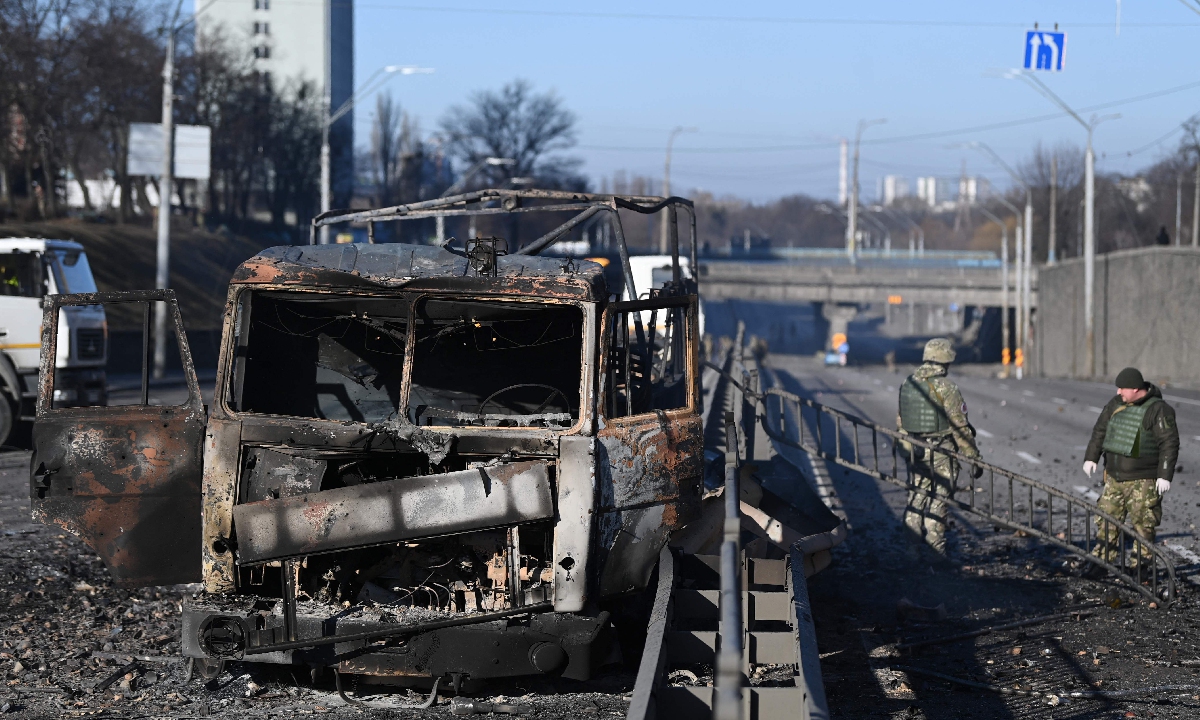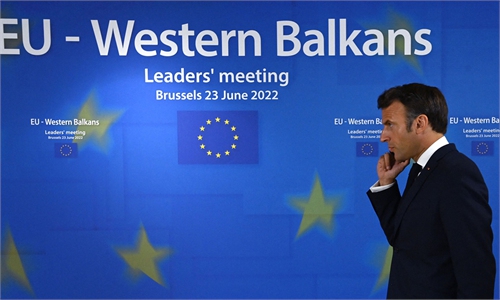EU’s ‘moral support’ for Ukraine masks a country beset by problems

Ukrainian soldiers stand next to a burnt Ukrainian army vehicle on the west side of the capital Kyiv on February 26, 2022. Ukraine and Russia are set to hold negotiations at the Belarusian-Ukrainian border. Photo: AFP
Last week, European Council President Charles Michel announced the decision to grant Ukraine and Moldova the status of EU candidate members. Ukraine signed its application for EU membership on February 28 and was approved by the EU as a candidate in 115 days, which is much less than the time spent by previous Central and Eastern European countries.
Obviously, the EU considers this issue as a form of "moral support." This moral is actually a clear message to Russia. To tell Ukraine that "you are our European brother." and also to tell Russia that "Ukraine is not your comrade."
The latter is more important - as a signal to Russia that the EU will not back down because of the Russia-Ukraine war.
For the countries that want to join the EU, this signal is meaningful. For example, Albania, Bosnia and Herzegovina, Montenegro, Kosovo, North Macedonia and Serbia in the Western Balkans all have the EU membership aspirations, and they have traditional ties with Russia.
However, EU public opinion generally agrees that Ukraine still has some way to go before it can truly become a member, as it must implement reforms in accordance with EU standards. The assessment conditions include whether the country has a stable democratic system, respect for human rights and a free market economy. This includes strengthening the rule of law and improving human rights. At the same time, its success depends on whether Russia and Ukraine can finally reach a peace agreement. The EU will not lower these standards just because it is Ukraine. The issues involved in these criteria are the same reasons why countries like Sweden, Denmark and the Netherlands have been opposed to admitting Ukraine.
In fact, Ukraine is still in the process of rebuilding its country after the end of the Cold War, and the process of dealing with the Cold War legacy is bound to be fraught with geopolitical risks.
The EU's "moral support" for Ukraine is an encouragement to the pro-Europe factions, but what does it mean for pro-Russia factions? Even if the war ends, I am afraid that the split will not be healed in the near future.
After the Cold War, Ukraine faced problems not only from the involvement of external forces that affected the reconstruction of its political structure, but also from the heavy Cold War legacy that constrained its own reforms.
Ukraine's corruption has become a focal point of unrest. The government also lacks the capacity to deal with minority issues, especially the ability to build a national consensus.
Since gaining independence, Ukrainians have constantly demonstrated a desire to integrate and become part of Europe, while at the same time the squeeze on ethnic Russians within its borders has grown stronger. This has given way to the possibility of intervention by outside forces.
A comparison with neighboring Poland shows where Ukraine's problems lie. Long before the EU decided to expand to the east, Poland set out to resolve the issues of borders and minorities, namely the territorial integrity of the nation-state and the protection of the cultural rights of minorities.
Ukraine today does not have the capabilities for solving these problems that Poland had at that time.
What is more, any kind of political choice for Ukraine today has to be made between EU integration and Russian integration due to the sharp confrontation between the two powerful neighbors.
The Cold War is seemingly over, but the long shadow is still there.
The next small- and medium-sized countries that are going to join the EU have similar problems, and it might be naive to think that integration into Europe will lead to a great national harmony.
Attention to these issues is necessary as Asia faces a more active involvement of European countries, especially the US-led NATO members, in the pursuit of the Asia-Pacific security frame.
The author is a senior editor with People's Daily, and currently a senior fellow with the Chongyang Institute for Financial Studies at Renmin University of China. dinggang@globaltimes.com.cn. Follow him on Twitter @dinggangchina


